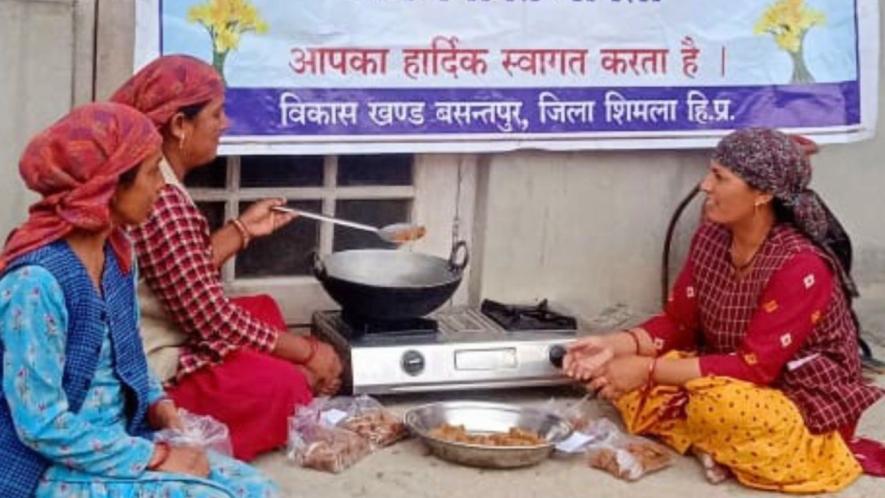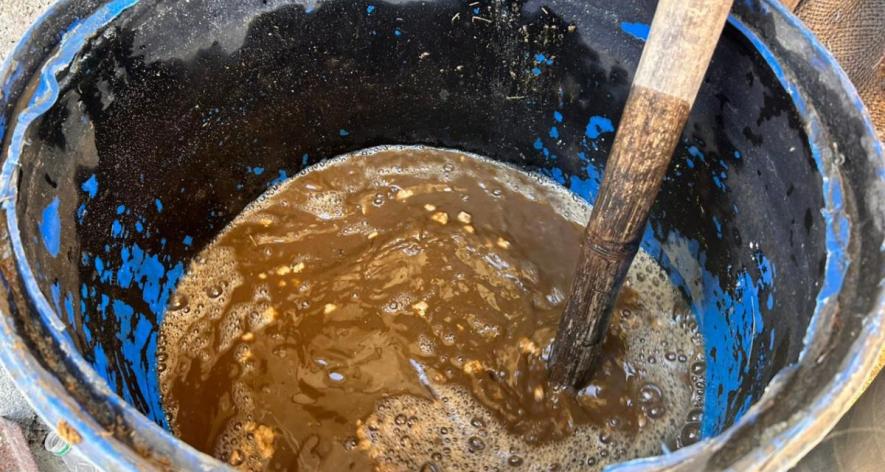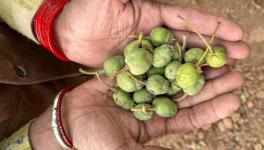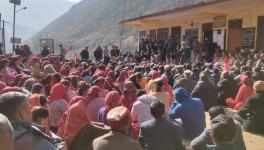Himachal Pradesh: Natural Farming Certification Faces Market Blues

Aruna Devi installed stalls at selling products produced by natural farming at various fairs (Photo - Rachna Verma, 101Reporters)
Shimla, Himachal Pradesh: Raman Sharma (35) and his father Hemraj Sharma (63) from Moolberi village in Shimla were brimming with hope and pride as they received their three-star rating under Certified Evaluation Tool for Agriculture Resource Analysis of Natural Farming (CETARA-NF) under Prakritik Kheti Khushhal Kisan Yojana (PK3Y) in 2022. They thought the different crops they grew on their six bigha plot would fetch good prices with this certification, which aims at helping farmers to transition to chemical-free farming. However, things were not easy.
Among the crops that the family cultivates are radish, onion, peas, spinach and garlic. He harvested three quintals of garlic last year, of which the state agriculture department purchased one quintal for Rs 350 per kg. According to Raman, the department selects a few farmers every year and buys a limited amount of their produce. This purchase is later used for seed distribution.
“The remaining two quintals had to be sold locally for Rs 125 per kg, just like chemically-grown garlic,” said a disappointed Raman.
Raman and Hemraj have been into natural farming for the last five years. A freelance web designer, Raman chose to make natural farming his main business and take it online. However, he faces credibility issues, especially in proving that the produce is truly natural. Yet, he is hopeful of better times as he knows people in metro cities are ready to spend money for good food.
"I have worked in metro cities in the past, so I know there is a market for natural products... Farming is always considered a non-profitable business, but I want to build a successful venture. For this, I believe quality is the key. That is why I chose natural farming," says Raman.
Raman’s case is no exception. Yesh Pal (35) from Rampur has been implementing natural farming techniques on his eight bigha plot for nearly four years. He received a two-star CETARA certification in 2023. However, he has not been able to sell a single crop, be it garlic, green peas or cauliflower, under the certification due to the lack of a functioning market system.
Yesh has not even renewed the certification after the one-year period as he has not benefited from it. He sold all his produce in the general marketplace for Rs 50 to 120 per kg.
The labour-intensive nature of natural farming is discussed in a compendium of case studies of the Centre for Science and Environment. "Natural farming is inherently labour-intensive and faces yield-related challenges in its initial years. Additionally, access to the market is the biggest challenge for natural farmers. Several initiatives are being taken, including self-declared certification, leveraging FPOs, captive markets, dedicated space in agricultural produce marketing committees and canopies. However their implementation and success remains to be seen."
About PK3Y, the article said, "The PK3Y programme has helped farmers decrease their dependence on the market for inputs and lower the cost of cultivation... Market-related initiatives planned by the state are in their initial phase. Planning seems to be on track, but implementation, execution and their success remain to be seen, especially with regard to self-certification and how FPOs are leveraged."

Raman Sharma showcasing his CETARA-NF certification online (Photo - Rachna Verma, 101Reporters).
The nitty-gritty
Himachal Pradesh is the first state in the country to introduce a certification for natural farming under PK3Y run by the agriculture department. The CETARA-NF has three ratings. Antral-PK3 is an entry-level rating, which signifies a farmer’s initial conversion from chemical to natural farming. Here the score is less than 30. Sadharan-PK3 signifies that natural farming practices have been adopted by the farmer, with some use of external non-chemical inputs. It is provided after one year of Antral-PK3. Here the score is from 30 to 50. Vishisht-PK3 rating is given to farmers doing natural farming strictly. It is provided after a year of Sadharan-PK3, and the rating score is above 50.
Under CETARA-NF, Himachal Pradesh is also the first state to announce minimum support prices (MSPs) for naturally farmed wheat and maize. "No other crop produced under natural farming techniques has MSP right now. The government is planning to sell the procured wheat and maize through PDS depots," Ravinder Singh Jasrotia, Additional Director, Department of Agriculture, told 101Reporters.
According to Jasrotia, they procure maize from the registered farmers only. "We procure a maximum of 20 quintals from a farmer," he added.
CETARA-NF certification is not mandatory for this, and just registering as a natural farmer with the agriculture department is enough. Farmers can register themselves offline by going to the department office, or during the department staff's field visits or training sessions.
Asked why the department does not procure the entire crop, Jasrotia explained that they wanted to reach out to maximum farmers, which was the main reason. Secondly, natural farming is usually done on less than one hectare of land in Himachal Pradesh. So it is less likely that farmers will produce more than 20 quintals. "We may consider revising it in future if the cultivated area increases," he added.
Unlike the costly organic certifications, CETARA is completely free. However, it follows a self-assessment system to evaluate the natural farming practices adopted. The grading is based on factors such as crop rotation, use of natural inputs and eco-friendly practices. Farmers who adopt sustainable methods, such as intercropping and keeping indigenous cows, are awarded higher ratings.
Farmers should register themselves on the government website and provide details of the crops and the land under cultivation. In addition, a farmer has to give names and phone numbers of three other farmers, who will attest to the information provided by the individual farmer. Upon verification by block technology manager (BTM), a final score and rating will be generated. No documentation is required to get the certificate.
A BTM is an outsourced position, wherein the agriculture department hires field staff holding MSc in agriculture or horticulture. To assist a BTM, two agriculture technological managers are provided. They do all the field work, conduct training sessions, create awareness and carry out field visits from time to time. However, there is no provision for special training or assistance to CETARA-certified farmers.
According to the state agriculture department’s 2023-24 annual report, 1,33,258 out of the total 1,36,270 registered farmers have CETARA certification. However, Raman felt the certification lacked credibility among buyers and consumers. “Any farmer can obtain it simply by answering a few multiple-choice questions about natural farming practices, without any real verification of produce quality. Moreover, no one is aware of this certification outside the state,” he pointed out.
Detailing his experience, Raman said, “When the government introduced CETARA-NF, as a progressive farmer, I hoped that this would allow me to move our business online and reach more buyers. Unfortunately, this turned out to be futile. The certification lacks credibility among buyers and consumers.”
Pankaj Thakur (38) of Nankhari village explained how he unsuccessfully tried selling his produce outside the state. "Nobody recognised my CETARA certification. Ultimately, I had to sell my full apple crop to Chaupal Naturals Farmers Producer Company Limited," he says.
Asked about CETARA-NF certification, Charanjiv Singh, president, Chandigarh Beopar Mandal, said he was not aware of it. Mohit Sood, president, Grain Market Association, Sector 26, Chandigarh, also said that he had never come across such a certification. However, both said that they were aware of certification for organic produce.
According to recent research, most of the CETARA-certified farmers fall under the two-star category (61.5%), followed by one-star (28.5%) and three-star (10%). This means only 10% have fully transitioned to natural farming, while 61.5% is somewhere in the middle of transition. One-star merely reflects the early stages of the transition journey.

Hemraj stirring the Jeevamrit every morning and evening to ensure better consistency (Photo - Rachna Verma, 101Reporters).
Expert insights
CETARA was designed to address the challenges faced by small farmers who cannot afford the high costs (Rs 15,000 to 70,000) and complex documentation required by organic certification schemes, depending upon multiple tests. Also, the assessment requires a lot of time, almost three years.
“This is a great initiative as it is in favour of farmers, but only if implemented well,” Padma Shri awardee and veteran natural farmer Nekram Sharma told 101Reporters.
“The process has been simplified, but the certification itself remains ineffective due to the absence of a well-established market system for certified produce. Moreover, there are concerns of labelling chemical produce as natural or mixing up of both types of produce. The certification can be prone to misuse as well, as many farmers are small landholders and take up natural farming only on a portion of their land,” he said.
Nekram suggested that there should be one exclusive counter in every mandi for natural produce. "Right now, the agriculture department runs weekly markets for naturally produced items, where farmers can sell their produce to the department. However, the problem is that the department procures only a limited amount, as less as one kg, from each farmer," he said, adding that buyers can reach out to farmers through the horticulture department's website.
Dr Manoj Gupta, Principal Extension Specialist (Agricultural Economics), State Project Implementing Unit, PK3Y, told 101Reporters that certification was built to help farmers get hassle-free and cost-effective certification. “In general, other certification processes [organic] itself are bureaucratic and time-consuming, which discourages many farmers from applying. In contrast, CETARA is hassle-free and comes without fees. It helps consumers trust that the farming methods are aligned with sustainability standards that support market differentiation, promote traditional practices and earn potential premium prices. Additionally, certification ensures supply chain transparency and accountability, encouraging broader adoption of sustainable farming practices,” he explained.
Dr Rajeshwar S Chandel, Vice-Chancellor, YS Parmar University of Horticulture, Solan, told 101Reporters that the main goal of this certification is to serve as an identity card for farmers. "The certification does not guarantee premium prices, though many farmers believe it does. We should not be making natural produce a premium product like organic, because when we label organic produce as premium, we directly make it exclusive to the elite class or a particular section," he explained.
On how good returns can be ensured to farmers, Chandel said, "It guarantees premium price indirectly as labour costs reduce and money used earlier on fertilisers is saved when a farmer takes up natural farming. Right now, farmers are not counting this as profit or are unable to see it... Farmers should establish a direct link with consumers located nearby as this can reduce transportation costs."
Asked if the certification could be misused, he stated that it is based on trust and relies on self-assessment by farmers. "The university also picks up random crops or produce for checking," he adds. YS Parmar University plays a vital role in research related to natural farming in the state.
He also shared that the government is working to provide suitable markets and that 10 FPOs are currently procuring products from CETARA-NF certified farmers. "They buy apples for Rs 250-300 per kg against the normal market rate of Rs 175-200," Chandel cites. However, he agreed that there is a need for improvement in the process.
Rachna Verma is a Himachal Pradesh-based freelance journalist and a member of 101Reporters, a pan-India network of grassroots reporters.
Get the latest reports & analysis with people's perspective on Protests, movements & deep analytical videos, discussions of the current affairs in your Telegram app. Subscribe to NewsClick's Telegram channel & get Real-Time updates on stories, as they get published on our website.
























